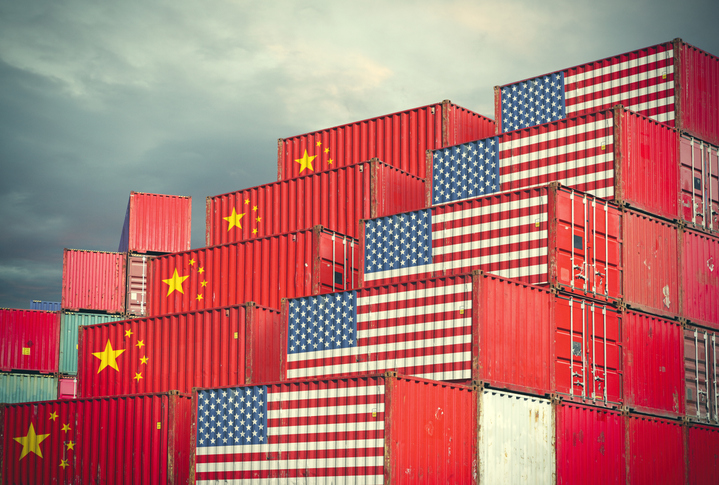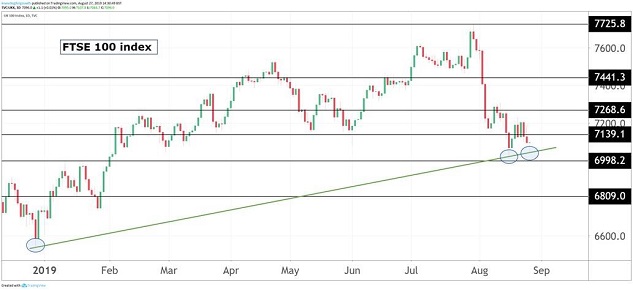This is how far share prices could fall if things get bad
US-China trade talks generate volatility, but how bad could things get and what should investors do?
27th August 2019 14:29
by Graeme Evans from interactive investor
US-China trade talks generate volatility, but how bad could things get and what should investors do?

In these far from ordinary times, it's telling that UBS is cutting its exposure to equities but still warning investors against battening down the hatches.
Risks to the global economy and markets have clearly intensified following an escalation in US-China trade tensions, prompting the Swiss bank's 'underweight' stance on equities this week.
But chief investment officer Mark Haefele told wealth management clients:
"While we think a reduction in risk is prudent, we note we are not bracing the portfolio for a traditional recession or the next Great Financial Crisis."
In a more traditional end to the economic cycle, Haefele said geopolitical risks and a global slowdown spreading from the manufacturing to the service sector would have warranted a larger underweight to equities.
The typical response of central banks in such an economic scenario would have been to raise interest rates in order to combat inflation, removing liquidity from the system.
Today, however, inflation is tame and government bond yields are at historic lows.
Haefele said: "When pension funds and other asset allocators rebalance portfolios in the coming months, there are few alternatives to equities. Central banks are in easing mode and fiscal stimulus is also on the horizon.
"Thus, even if the manufacturing slowdown spreads to the wider economy, we believe the downside risk to equities is closer to 15% than 25%."

Source: TradingView Past performance is not a guide to future performance
He went on to warn investors who try to time a rebound too perfectly that they are liable to do more damage to their portfolios than those who take the long view.
UBS is making three changes to its asset allocation based on the need to address the US-China trade war risk, even though the bank still believes equities are attractively valued relative to government bonds.
Haefele said: "Although action by the US Federal Reserve can minimize the downside, we are no longer confident that Fed easing will push stocks significantly higher. A shift in the outlook for trade talks, either toward further escalation or a truce or deal, could change this outlook rapidly."
UBS still believes that the US can avoid recession in 2020, with the impact of all the recent additional tariffs representing only a marginal drag on the world's biggest economy.
This could be undone, however, if the next round of tariffs on the US covers a range of consumer goods, such as smartphones, personal computers, cameras, and clothing, for which it will be harder to find substitutes from elsewhere.
UBS expects the Federal Reserve to cut rates by 75 basis points over the next 12 months, with authorities in China also retaining firepower through access to fiscal and monetary policies or by allowing the yuan to move gradually lower.
Robust consumer spending in the US should help mitigate the damage from weaker manufacturing and investment, although Haefele warned that interpreting economic data could become harder if companies bring forward orders in anticipation of higher tariffs.
In addition, President Trump may call a truce with China if it looks like an economic downturn will hinder his chances of winning a second term in the November 2020 election.
Haefele said:
"At this time, we would caution investors against large equity underweights as if they were preparing for a typical recession or the next Great Financial Crisis."
These articles are provided for information purposes only. Occasionally, an opinion about whether to buy or sell a specific investment may be provided by third parties. The content is not intended to be a personal recommendation to buy or sell any financial instrument or product, or to adopt any investment strategy as it is not provided based on an assessment of your investing knowledge and experience, your financial situation or your investment objectives. The value of your investments, and the income derived from them, may go down as well as up. You may not get back all the money that you invest. The investments referred to in this article may not be suitable for all investors, and if in doubt, an investor should seek advice from a qualified investment adviser.
Full performance can be found on the company or index summary page on the interactive investor website. Simply click on the company's or index name highlighted in the article.